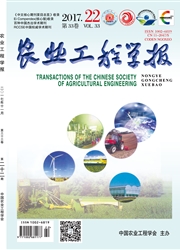

 中文摘要:
中文摘要:
促进“农业、农村、农民”向“生态产业、生态城镇、生态居民”的转型发展,是生态文明建设中破解“三农”问题的有效途径。“三农”问题具有显著的地域分异、时间变异和相互作用等属性;生态文明建设与新时期“三农”问题的破解相辅相成,生态文明建设通过生态安全、环境支撑、生态经济、生态文化、生态人居和生态制度6大体系为破解“三农”问题提供了路径,而“三农”问题的破解较大程度上推动了生态文明建设。针对平谷区“三农”发展中存在的大我与小我、近期利益与长远利益、政府与市场等矛盾问题,梳理了“三农”向“三生”转型的理论基础,并通过建设生态城镇、发展生态产业和培育生态居民3条路径加快“三农”向“三生”的转型,以期为平谷区生态文明建设工作提供指导。
 英文摘要:
英文摘要:
It is an effective way to solve issues concerning agriculture, rural and farmer by transforming “agriculture, rural and farmer” to “ecological industry, ecological town and ecological residential”. The issues concerning “agriculture, rural and farmer” possess the basic characteristics of spatial variation, temporal evolution, subjective cognition and in-teraction. The construction of ecological civilization and the solution of issues concerning “agriculture, rural and farmer”complement each other. On one hand, the construction of ecological civilization provides a path to solve the issues concern-ing “agriculture, rural and farmer” by six systems, including ecological security system, environmental support system, ecological economy system, ecological culture system, ecological habitat system and ecological system. On the other hand, the solution of issues concerning “agriculture, rural and farmer” promotes the construction of ecological civilization greatly. By the comparative study methods, this essay points out lfaws in the development of agriculture, rural and farmer in Pinggu district, reviews the theoretical basis that transforming “agriculture, rural and farmer” to “ecological industry, ecological town and ecological residential”, and constructs three paths to speed up the realization of “ecological industry, ecological town and ecological residential”, including constructing ecological cities and towns, developing eco-industry and cultivating ecological residential. The results provide guidance for the ecological civilization construction of Pinggu District.
 同期刊论文项目
同期刊论文项目
 同项目期刊论文
同项目期刊论文
 期刊信息
期刊信息
